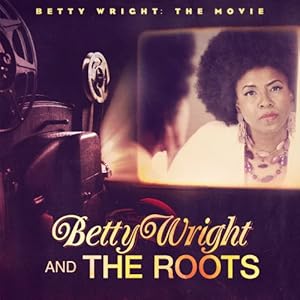 Veterans in their respective genres, Betty Wright and The Roots have nothing to prove. Philly’s finest have been consistently churning out the best hip-hop albums – the best records of any genre, honestly – for nearly two decades now, and Wright, after a string of insistently funky ’70s and 80’s hits, collects paychecks as an in-demand vocal coach. One might expect a full-scale reinvention of the wheel when these two visionaries hit the studio together, but Betty Wright: The Movie surprises by, honestly, not being experimental at all. It’s just a Betty Wright album, with The Roots as her backing band – which means it’s deeply funky, sung to perfection, and it grooves hard.
Veterans in their respective genres, Betty Wright and The Roots have nothing to prove. Philly’s finest have been consistently churning out the best hip-hop albums – the best records of any genre, honestly – for nearly two decades now, and Wright, after a string of insistently funky ’70s and 80’s hits, collects paychecks as an in-demand vocal coach. One might expect a full-scale reinvention of the wheel when these two visionaries hit the studio together, but Betty Wright: The Movie surprises by, honestly, not being experimental at all. It’s just a Betty Wright album, with The Roots as her backing band – which means it’s deeply funky, sung to perfection, and it grooves hard.
Betty Wright: The Movie is a soul record of the instant vintage variety – songs feel familiar and lived in, ?uesto’s drums find the pocket and nail down the groove with unflappable finesse, background singers dipped in reverb float in and out to offer point-counterpoint discussion. Betty herself reasserts herself as a supremely convincing vocalist, knowing when to employ her restrained, plaintive alto, and when to engage emotional release and soar up to the whistle-pitch she perfected long before Mariah had a contract. The entire thing sounds like it should be listened to on scuffed vinyl, particularly the slow-burn funk of “Grapes on the Vine” (which not even a guest verse from Lil’ Wayne can derail, try as he might) or the retro, Philly-soul-spackled “Whisper in the Wind”. One can’t fault Betty Wright: The Movie its consistency; songs are given space to grow into something special, and cultivated to breed instant recognition.
It’s perhaps worth noting that, lyrically, Betty settles into a fairly pedantic space here; “Baby Come Back”, structured as a late-night phone call between two ex-lovers, hinges on the hook “baby come back; you know that I miss you, baby”, and too many tracks seem to hinge on Betty’s insistence on dispensing pre-packaged nuggets of wisdom (“get yourself a real woman so you can be a real man” on “Real Woman”; offering a list of do’s and don’ts in the interest of retaining your significant other’s interest on “In the Middle of the Game (Don’t Change the Play)”). It may sound like damning with faint praise to say that Betty makes her pedestrian prose sound downright lively, but it’s a testament to her as a singer; Joss Stone (who duets with Wright on “Whisper in the Wind”) wouldn’t be able to transcend this material, but Wright wrings the correct level of emotion out of every note, as a smart, intuitive singer who knows when to swing for the stands and when to pare things down to an understated coo. Listen to her reserved performance on “The One” – it’s a tidal wave of repressed emotion, and it’s a glorious soul ballad, superficially resilient but, realistically, seconds away from tears.
With all this focus on Betty’s vocal performance – the true star of the show, even as The Roots provide able support – it seems superfluous to pin a couple of tacky rap verses to some of these tracks. High-profile emcees Snoop and Lil’ Wayne find themselves strictly on autopilot here; they add nothing to their respective tunes, and while it’s admirable that Betty, so entrenched in the old-school, is willing to give due propers to modern luminaries (opener “Old Songs” even shouts out comparative young bucks like India.Arie and The-Dream), it seems like a rhymer like, I dunno, Black Thought from The Roots would complement her style nicely. Snoop’s been phoning it in for years now, and Weezy is insistent on making a career out of sheer unpleasantness.
Small potatoes, ultimately – Betty Wright’s comeback, despite the Roots’ sterling Illadelph pedigree, gazes back towards classic Stax and Philly soul much more often than it peers into hip-hop’s future. If certain tracks are weaker than others, you can’t deny Wright’s voice and that persistent groove, and Wright struts into middle age without a hint of age or self-consciousness.
Grade: B

